News
First year learners at Strathclyde and Salford Universities receive BAPO goody bags
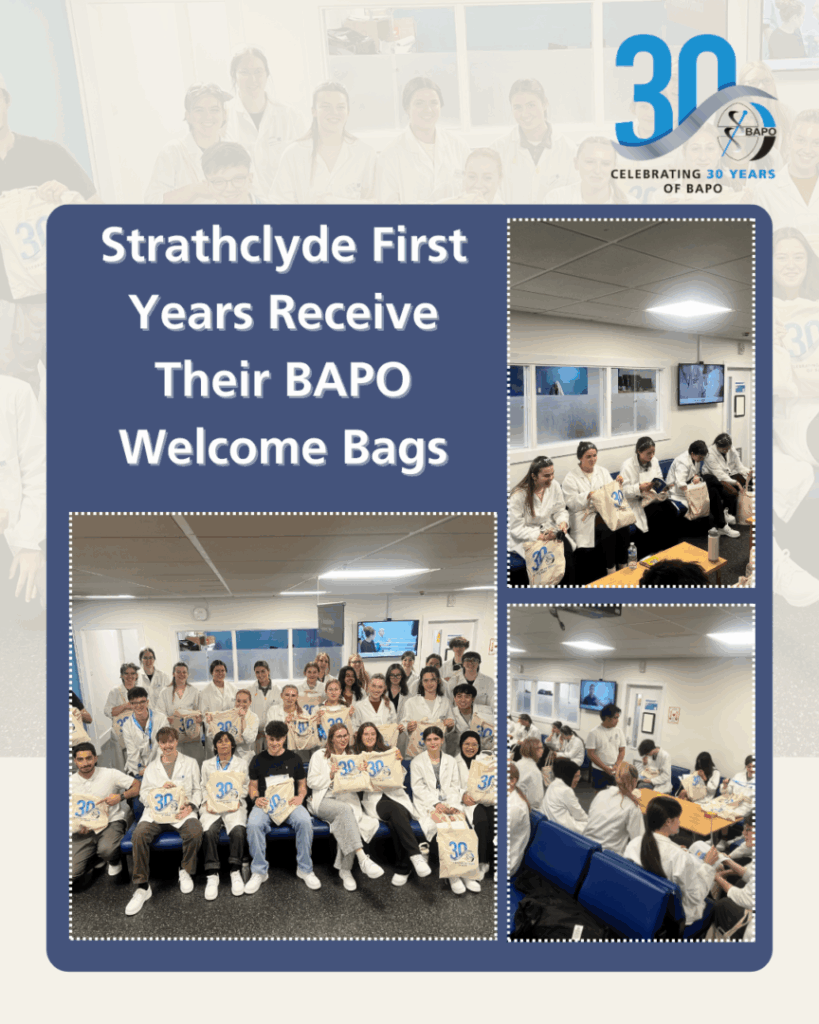

This week, first-year prosthetics and orthotics (P&O) students at the University of Salford and the University of Strathclyde received their BAPO “Welcome to the Profession” goody bags, marking an exciting start to their journey into the P&O community. 🦾📚
The packs are designed to introduce students to the profession early, providing useful tools, resources, and a sense of connection with the professional body from the outset. Students shared what they loved most:
University of Salford:
💬 “Having an awareness so early into my career is invaluable.”
💬 “Makes you feel more connected to the industry and a part of the community before you are qualified.”
💬 “Insight into the industry, connections, benefits, and a team of assistance.”
University of Strathclyde:
💬 “I love the useful tools like the tape measure and goniometer — they’ll be helpful in our patient assessments.”
💬 “The water bottle was a nice touch.”
💬 “The resources about mentorship and what is available through BAPO are really helpful.”
Receiving these packs helps students build confidence, develop practical skills, and feel part of the P&O professional community from day one.
BAPO is proud to support the next generation of prosthetists and orthotists as they embark on their learning journey. 💙
Seeking Insight from UK Prosthetists!
Loughborough University is gathering professional input on long-term residual limb care for lower-limb amputees, as part of a study focusing on preventing secondary issues such as skin breakdown, socket discomfort, and volume fluctuation.
As a Prosthetist – you can provide invaluable guidance to ensure the research and resulting assistive product align with real clinical priorities. Please consider taking a few minutes out of your day to fill in the form below. Any questions about the study should be directed to Sarah Brown: s.brown-22@student.lboro.ac.uk
Survey closes: 15 December 2025
Take part here: https://forms.office.com/r/ZbhcXiGp0G
Anushika Dayananda Appointed Vice-Chair of Research Committee

We are pleased to announce the appointment of Anushika Dayananda (Anu) as the new Vice-Chair of the Research Committee. Anu brings a strong dedication to advancing research that supports both practitioners and patients, and her appointment marks an exciting step forward for the committee.
Reflecting on her new role, Anu shared:
“Taking on the Vice Chair position is a new milestone for me, and I am grateful for the trust placed in me. Although this is my first leadership role of this kind, I am inspired by the opportunity to collaborate, learn, and help drive research that pushes our profession forward. I hope to bring energy, curiosity, and commitment to supporting work that truly makes a difference to patients and practitioners alike.”
Anu’s enthusiasm, curiosity, and commitment will play an important role in strengthening the committee’s ongoing projects and future initiatives. We look forward to the insight and energy she will bring as Vice-Chair.
Please join us in congratulating Anu on this well-deserved appointment.
New Launch – Prosthetics and orthotics stakeholder group
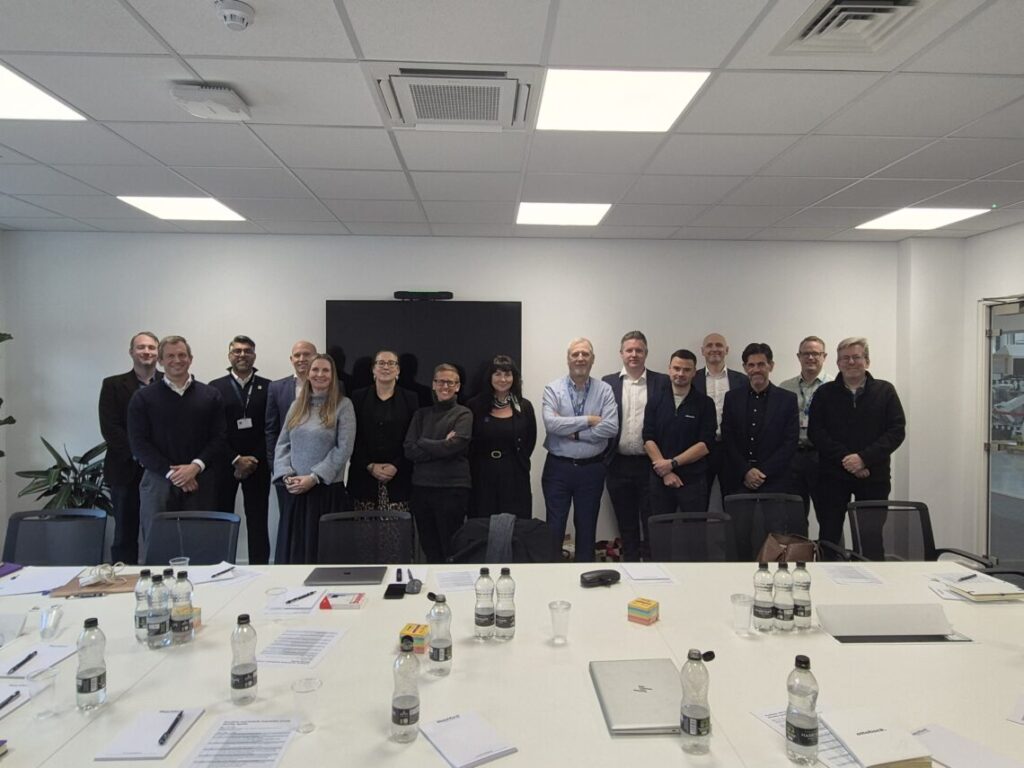
BAPO is excited to announce the launch of a new Prosthetics and Orthotics stakeholder group led jointly by BAPO and Limb Power. The group has been created to work together on the key issues shaping the prosthetics and orthotics profession and the people who rely on our services.
Our inaugural meeting has taken place and brought together voices from across the field. There was representation from the NHS, the private sector, charities, the NHS Supply Chain, ISPO and the BHTA. This collaborative energy is exactly what we hoped for and marks a strong start to the work ahead.
More updates will follow as the group moves forward with shared priorities and practical action.
Job advert – Thuasne – Orthotist – London
Job Advert – Let’s Go Physio – Senior Orthotist & 2D Gait Analysis Specialist – Nelson, Lancashire and across the North-West
STAND – Why it’s time for the private and third sectors to work together
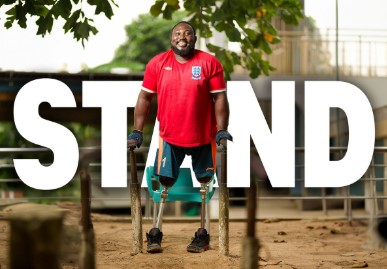
From Tom Williams OBE, founder of STAND
In July I went to ISPO’s conference in Sweden, and my mind is still buzzing. It was a mix of innovation, technical jargon, business cards, and big ideas. I was representing STAND, an NGO focused on providing mobility to eight countries in sub-Saharan Africa.
But amidst all this, one question kept coming back to me: how can business and charities work together to help all amputees across the world and not just in high income countries?
For too long, we’ve operated in silos, assuming governments will patch the gaps. But those gaps are growing in lower income countries, and it feels like no one’s coming to fix them.
Business and non-profits are already intertwined
We’re beginning to see businesses are more linked with social and environmental impact and solutions, whether they like to admit it or not. However, this isn’t about blame. It’s about collaboration.
Take the mental health crisis linked to social media. Tech platforms thrive on attention, often at the cost of their users’ wellbeing. Meanwhile, mental health organisations, often underfunded and overstretched, are left to clean up the mess. What would it look like if tech companies co-created healthier platforms with mental health experts from the ground up?
The cost of a prosthetic limb varies wildly depending on where you live. STAND’s model facilitates limb donations from high income countries to low income countries, but this is a temporary fix. The long-term solutions are systems designed by governments, companies, and NGOs together – where sustainability, equity and access are the starting point.
Looking Ahead: how could we start bridging the gaps – together?
Let’s stop waiting for someone else to fix everything. And let’s stop expecting the not-for-profit world to carry the moral weight alone. The future depends on genuine partnerships, ones where every sector brings its strengths, owns its responsibilities, and shares the load.
So, what would it take for all of us to step out of our silos?
Welcome to the BAPO Executive Committee – Nicola McCormack
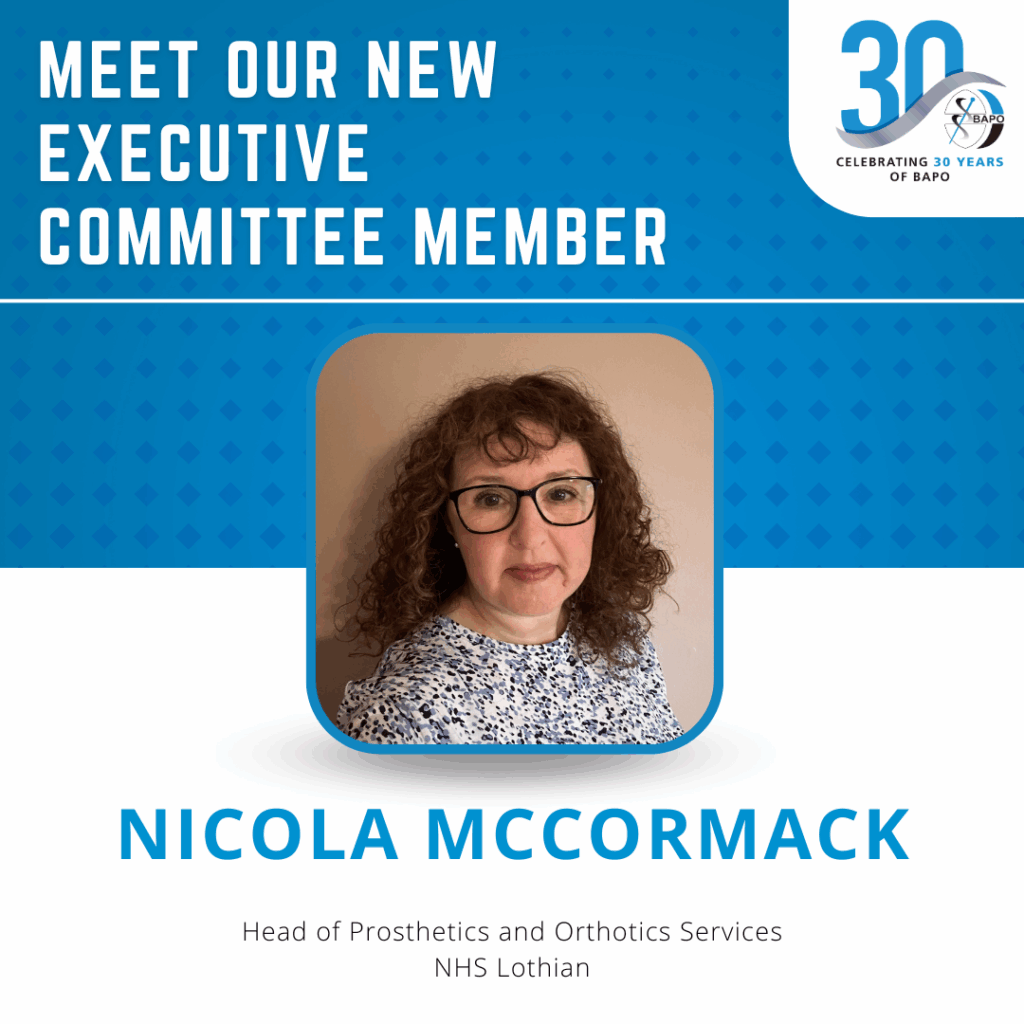
The British Association of Prosthetics and Orthotics (BAPO) is delighted to welcome Nicola McCormack to the Executive Committee.
Nicola graduated from the National Centre at the University of Strathclyde in 1991 and has devoted her career to advancing Prosthetics and Orthotics (P&O) within NHS Lothian, where she now holds the position of Head of Prosthetics and Orthotics Services.
Throughout her career, Nicola has demonstrated a strong passion for promoting the profession and for supporting the recruitment, development, and progression of P&O staff. She is particularly committed to succession planning and creating clear career pathways to strengthen and sustain the workforce for the future.
In addition to her leadership role within NHS Lothian, Nicola contributes extensively to the wider profession. She serves as a clinical examiner for the University of Strathclyde Clinical Exams, is a member of the Biomedical Engineering Industrial and Clinical Advisory Group at the University, and is the current Chair of the Prosthetics Managers and Leads Group for Scotland.
BAPO is thrilled to welcome Nicola to the Executive Committee and looks forward to the valuable expertise, insight, and passion she will bring to the association’s work in promoting excellence within Prosthetics and Orthotics.
AHP Dementia Webinar 10th December 2025 – Connecting you to support The Balance System© in dementia. Innovation and Improvement in Action
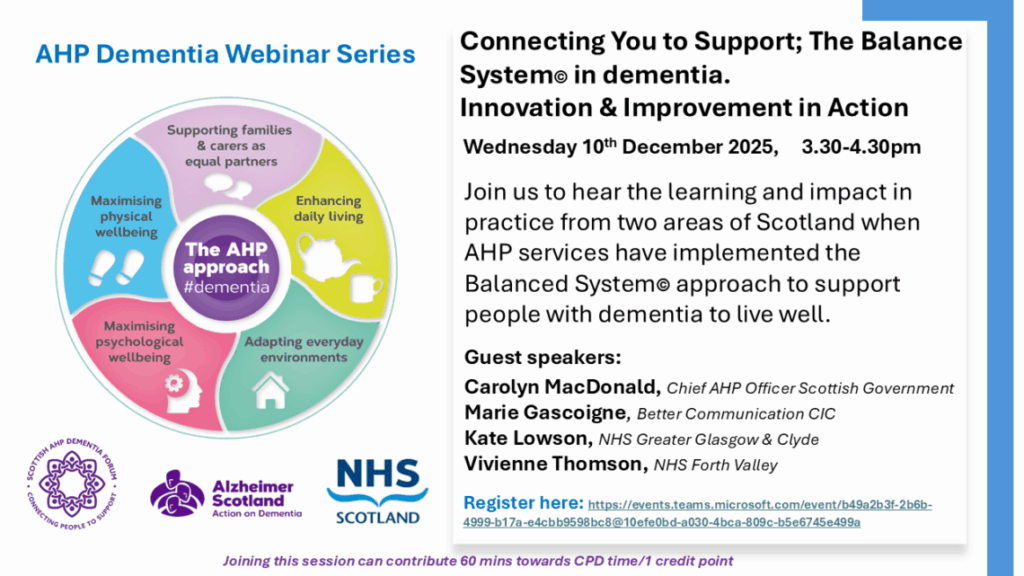
Warm invitation to join the National AHP Dementia Webinar series – sharing practice, connecting people, connecting support.
The webinar will be held on MSTeams
“Connecting you to support. The Balance System© in dementia. Innovation and Improvement in Action”- AHP Dementia Webinar on 10th December 2025, 3:30 -4:30pm
Join us to hear the learning and impact in practice from two areas of Scotland when AHP services have implemented the Balance System© approach to support people with dementia to live well.
Guest Speakers :
Carolyn MacDonald, Chief AHP Officer Scottish Government
Marie Gascoigne, Better Communication CIC
Kate Lowson, NHS Greater Glasgow & Clyde
Vivienne Thomson, NHS Forth Valley
Follow the link to register: https://events.teams.microsoft.com/event/b49a2b3f-2b6b-4999-b17a-e4cbb9598bc8@10efe0bd-a030-4bca-809c-b5e6745e499a
You can listen again to any of our previous AHP Dementia webinars by following this link: www.alzscot.org/community-support/allied-health-professionals/
(scroll down webpage to find the webinar links)